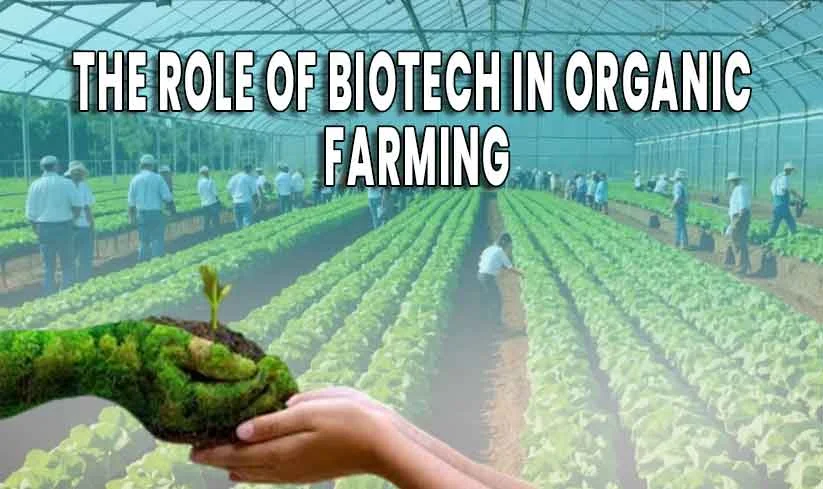The Role of Biotech in Organic Farming
Organic farming has gained immense popularity as consumers increasingly demand food produced without synthetic pesticides, fertilizers, or genetically modified organisms (GMOs). However, as the global population grows and climate change threatens agricultural productivity, organic farmers face challenges in maintaining yields while adhering to strict organic standards.
Biotechnology, often associated with GMOs, is sometimes viewed as contradictory to organic farming. However, certain biotech innovations can complement organic practices by enhancing soil health, improving pest resistance, and increasing crop resilience without relying on synthetic chemicals. This article explores how biotechnology can support organic farming while respecting its core principles.
Understanding Organic Farming and Biotechnology
What is Organic Farming?
Organic farming is an agricultural system that emphasizes:
- Natural pest and disease control
- Soil fertility through composting and crop rotation
- Biodiversity conservation
- Avoidance of synthetic chemicals and GMOs
Certified organic farms must comply with regulations that prohibit synthetic inputs, ensuring food is produced sustainably.
What is Biotechnology in Agriculture?
Agricultural biotechnology involves using scientific techniques to modify organisms for improved traits. While GMOs are the most controversial, biotechnology also includes:
- Microbial inoculants (beneficial bacteria and fungi)
- Biofertilizers (natural nutrient enhancers)
- Marker-assisted breeding (non-GMO crop improvement)
- CRISPR gene editing (precise DNA modifications without foreign genes)
These tools can align with organic farming when used responsibly.
How Biotechnology Supports Organic Farming
1. Enhancing Soil Health with Microbial Biotechnology
Healthy soil is the foundation of organic farming. Biotech-derived microbial inoculants, such as mycorrhizal fungi and nitrogen-fixing bacteria, improve soil fertility naturally.
- Mycorrhizal Fungi: These symbiotic fungi colonize plant roots, increasing nutrient and water absorption.
- Rhizobacteria: Bacteria like Azospirillum and Rhizobium fix atmospheric nitrogen, reducing the need for synthetic fertilizers.
Studies show that microbial biostimulants can increase crop yields by 10-30% while maintaining organic integrity.
2. Natural Pest Control Through Biopesticides
Organic farmers rely on biological pest control instead of synthetic pesticides. Biotechnology enhances this through:
- Entomopathogenic Fungi: Beauveria bassiana and Metarhizium anisopliae infect and kill pests without harming beneficial insects.
- Bacterial Insecticides: Bacillus thuringiensis (Bt) produces toxins lethal to specific pests but safe for humans and pollinators.
These biopesticides are approved for organic use and provide effective pest management.
3. Disease Resistance via CRISPR and Marker-Assisted Breeding
Traditional organic farming struggles with plant diseases, often requiring copper-based fungicides (which have environmental concerns). Biotechnology offers solutions:
- Marker-Assisted Breeding: Identifies disease-resistant genes in plants, speeding up natural breeding.
- CRISPR Gene Editing: Edits plant DNA to enhance disease resistance without introducing foreign genes (non-GMO).
For example, researchers have used CRISPR to develop mildew-resistant wheat and blight-resistant potatoes—traits that benefit organic farmers.
4. Drought and Climate Resilience
Climate change poses risks to organic farming through droughts and extreme weather. Biotech solutions include:
- Drought-Tolerant Microbes: Certain soil microbes help plants retain water.
- Stress-Resistant Crops: Non-GMO breeding techniques develop crops that thrive in harsh conditions.
Such innovations help organic farms remain productive despite environmental challenges.
5. Reducing Food Waste with Bio-Based Preservatives
Post-harvest losses are a major issue in organic farming due to limited synthetic preservatives. Biotechnology offers natural alternatives:
- Edible Coatings: Chitosan (from fungi) extends shelf life by preventing microbial growth.
- Plant-Derived Antimicrobials: Essential oils and bacteriocins inhibit spoilage organisms.
These methods reduce food waste without compromising organic standards.
Ethical and Regulatory Considerations
GMOs vs. Organic Farming
GMOs are excluded from organic certification due to concerns about genetic contamination and corporate control of seeds. However, newer biotech tools like CRISPR (which does not involve transgenes) may challenge this stance. Some organic certifiers are debating whether gene-edited crops could be permitted if they mimic natural mutations.
Consumer Perception
Many organic consumers oppose biotechnology, associating it with industrial agriculture. Transparency and education are key—farmers must communicate how biotech tools align with organic principles.
Regulatory Frameworks
Organic certifications (USDA Organic, EU Organic) currently ban GMOs but allow certain microbial biostimulants and biopesticides. As biotechnology evolves, regulations must adapt to distinguish between beneficial and harmful applications.
Case Studies: Biotech in Organic Farming
1. Nitrogen-Fixing Bacteria in Organic Soybeans
Brazilian organic farmers use Bradyrhizobium inoculants to enhance soybean yields without synthetic nitrogen fertilizers. This practice reduces costs and environmental impact.
2. Mycorrhizal Fungi in Vineyards
Organic vineyards in France apply mycorrhizal fungi to improve grapevine resilience against drought and disease, reducing the need for copper-based fungicides.
3. CRISPR-Edited Organic Tomatoes
Researchers are developing CRISPR-edited tomatoes with enhanced nutrient content and disease resistance. If approved by organic standards, such crops could revolutionize organic produce.
Future Prospects
The integration of biotechnology into organic farming could lead to:
- Higher Yields: Reducing the yield gap between organic and conventional farming.
- Reduced Chemical Use: Even in conventional farming, biotech can minimize synthetic inputs.
- Climate Adaptation: Helping organic farms withstand droughts and pests.
However, the organic movement must carefully evaluate which biotech tools align with its ethos.
Conclusion
Biotechnology, when applied responsibly, can strengthen organic farming by improving soil health, pest control, and crop resilience without synthetic chemicals. While GMOs remain controversial, microbial biostimulants, gene editing, and bio-based solutions offer promising synergies with organic principles.
The future of organic farming may depend on embracing select biotech innovations while maintaining strict environmental and ethical standards. By doing so, organic agriculture can scale sustainably, feeding the world without compromising ecological integrity.





